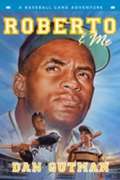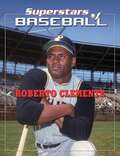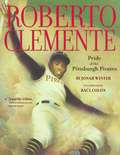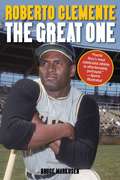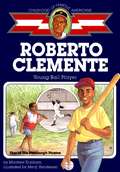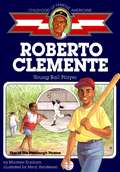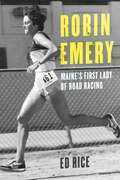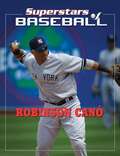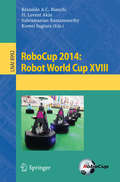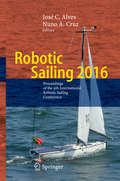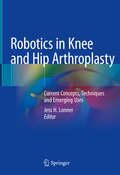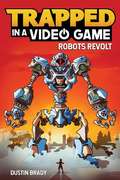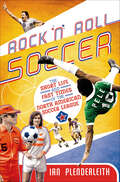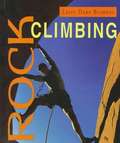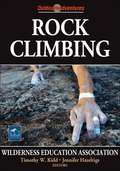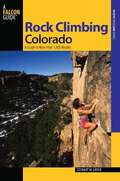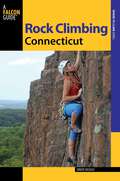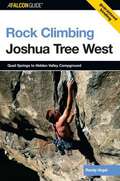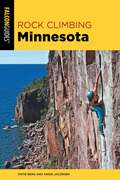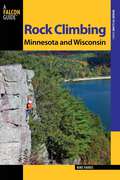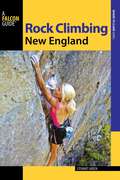- Table View
- List View
Roberto & Me
by Dan GutmanSometimes you can change history . . . and sometimes history can change you. When Stosh travels into the past to meet Roberto Clemente, a legendary ballplayer and a beloved humanitarian, he's got only one goal: warning Roberto not to get on the doomed plane that will end his life in a terrible crash. In the sixties, Stosh meets free-spirited Sunrise, and together they travel across the country to a ball game that leaves them breathless-and face-to-face with Roberto. But when the time comes for Stosh to return to the future, he finds that the adventure has only just begun. . . . Join Stosh and Sunrise on a journey that will take you into the past, from the excitement of Woodstock to a life-changing encounter with Roberto Clemente-and into a surprising future!
Roberto Clemente (Superstars of Baseball)
by Tania RodriguezNot many baseball players are as legendary as Roberto Clemente. He broke color barriers. He gave back to his community. And through it all, he played great baseball. During his career with the Pittsburgh Pirates, he did some amazing things. Sadly, Clemente's life was cut short by a plane crash. Today, however, his memory lives on. Fans everywhere still think of the player from Puerto Rico as an inspiration to us all.
Roberto Clemente: Orgullo de los Piratas de Pittsburgh
by Jonah Winter Raúl ColónNIMAC-sourced textbook
Roberto Clemente: Pride of the Pittsburgh Pirates
by Jonah WinterOn an island called Puerto Rico, there lived a little boy who wanted only to play baseball. Although he had no money, Roberto Clemente practiced and practiced until--eventually--he made it to the Major Leagues. America! As a right-fielder for the Pittsburgh Pirates, he fought tough opponents--and even tougher racism--but with his unreal catches and swift feet, he earned his nickname, "The Great One." He led the Pirates to two World Series, hit 3,000 hits, and was the first Latino to be inducted into the Hall of Fame. But it wasn't just baseball that made Clemente legendary--he was was also a humanitarian dedicated to improving the lives of others.
Roberto Clemente: The Great One
by Bruce MarkusenThirty-five years ago, Roberto Clemente made baseball history when he became the first Latin American to enter the Hall of Fame. Roberto Clemente: The Great One evaluates one of the game's most dynamic players and perhaps its most selfless humanitarian. From modest beginnings in Carolina, Puerto Rico, to a legendary career with the Pittsburgh Pirates, to his tragically premature death in a plane crash, Roberto Clemente remains one of baseball's most compelling characters. Interviews with teammates Willie Stargell and Al Oliver, former major league commissioner Bowie Kuhn, and close friends of Clemente lend insight into his character and contributions. Markusen successfully analyzes the cultural misunderstandings between Clemente and his audience as well as the struggles and hardships he and other Latin American players endured during that era. Regardless, he is a key example of how athletes can be more than just a source of entertainment. Undoubtedly, Clemente was never give the national exposure he deserved until the 1971 World Series, and subsequently his death in 1972 not only cut short a tremendous career but also deprived the world of more humanitarian efforts to those in need. The Great One fully examines Clemente's legacy, which he developed at a time of unprecedented success for Latin American players.
Roberto Clemente: Young Baseball Player
by Meryl Henderson Montrew DunhamTraces the personal life and baseball career of the Puerto Rican baseball superstar, from his childhood love of the game through his professional career and untimely death to his election to the Hall of Fame in 1973.
Roberto Clemente: Young Baseball Player (Childhood of Famous Americans Series)
by Montrew DunhamThis inspirational account of one of Puerto Rico's -- and America's -- most beloved heroes explores the early years of a man who was both a Hall of Fame right fielder and a courageous humanitarian.
Robin Emery: Maine's First Lady of Road Racing
by Ed RiceRobin Emery of Ellsworth, Maine is a pioneer in the sport of road racing, or distance running. She fell in love with the sport of running in 1967 and, fifty years later, she is still at it. When she started, women weren&’t allowed to race with men and there were no sports teams for girls in schools, but that was no deterrent. Robin persisted, trying a range of sports as a child from golf to football before establishing herself in the field of running. Along the way she has encouraged and inspired countless girls and women—including Maine&’s Olympic gold medal winning Joan Benoit Samuelson.
Robinson Canó (Superstars of Baseball)
by Tania RodriguezRobinson Canó has had an amazing life in baseball. He's won the World Series. He's played in All-Star Games, won awards, and made millions of dollars. He's played for one of baseball's most popular teams, the New York Yankees. He's even won the Home Run Derby. Read how Canó learned to love baseball from his father, José. Follow Canó's journey from playing baseball in a Dominican high school to playing in the Major Leagues. Explore the life of one of baseball's biggest stars--and find out how he went from big dreams to the big leagues.
RoboCup 2014: Robot World Cup XVIII
by H. Levent Akin Reinaldo A. C. Bianchi Subramanian Ramamoorthy Komei SugiuraThis book includes the thoroughly refereed proceedings of the 18th Annual RoboCup International Symposium, held in Joao Pessoa, Brazil, in July 2014. The 36 revised papers were carefully reviewed and selected from 66 submissions and include 11 champion-team papers, three special-track papers on open-source hardware and software, nine papers on the advancement of the RoboCup leagues track, and three best papers. The contributions present current research and educational activities in the field of robotics and artificial intelligence with a special focus on the interaction between robots and humans.
Robotic Sailing 2016
by José C. Alves Nuno A. CruzThis book contains selected papers that address a variety of topics related to the design, development and operation of unmanned and fully autonomous sailing boats. These papers were presented in the 9th International Robotic Sailing Conference, in association with the 9th World Robotic Sailing Championship that took place in Viana do Castelo, Portugal from the 5th to 10th of September 2016. The book is divided in three parts, each focusing on key aspects of robotic sailing. The first part addresses the design, construction and validation of autonomous sailboat platforms, including their rigs, appendages and control mechanisms. The second part is devoted to the development of sensors and algorithms to enhance the performance of robotic sailing boats, in terms of their speed, course control and manoeuvring ability. Finally, the papers in the last part are dedicated to the improvement of behaviours required for the accomplishment of complex autonomous missions. Robotic sailing is a relatively new multidisciplinary area of research, with a recognized great potential for persistent ocean observation. Using the wind for boat propulsion is something mankind has been doing for centuries. Automating and optimizing the sailing process in the harsh marine environment is an ever present challenge which is now promising to bear fruit.
Robotics in Knee and Hip Arthroplasty: Current Concepts, Techniques and Emerging Uses
by Jess H. LonnerThis state-of-the-art book focuses specifically on the current and emerging uses of robotics for knee and hip arthroplasty, with an expanding market anticipated, particularly as costs drop, data emerges and surgical efficiencies improve. It is divided into four main sections. Part one covers the background and basic principles of robotics in orthopedic surgery, discussing its history and evolution, current concepts and available technologies, perioperative protocols for recovery and pain management, economic considerations, and risks and complications. The second and third parts focus on the techniques themselves for the knee and hip respectively, including unicompartmental and bicompartmental knee arthroplasty, patellofemoral arthroplasty, and total knee and hip arthroplasty utilizing Navio, Mako, iThink, Omni and ROSA Knee robots. The final section presents the emerging use of robotics in spine surgery as well as for hospital process improvement. Presenting the most current techniques, technology and evidence, Robotics in Knee and Hip Arthroplasty will be a valuable resource for orthopedic surgeons, residents and fellows looking to implement and utilize these developing management strategies in their clinical practice.
Robots Revolt (Trapped in a Video Game #3)
by Dustin Brady Jesse BradyKids who love video games will love this third installment of the new 5-book series about 12-year old Jesse Rigsby and the wild adventures he encounters inside different video games. The robots are here and they're not happy, at all. After accidentally releasing the robot villains from Super Bot World 3 into the real world, Jesse Rigsby's got to figure out a way to make everything right before anyone gets hurt. He'd usually rely on his friend Eric to help him with this sort of thing, but he's gone missing. <p><p> To find Eric, Jesse will have to survive rickety mine carts, sewer piranhas, mysterious men in suits, and a 100-foot-tall robot named Goliatron. This is Jesse's most dangerous adventure yet because this time the video game is real. And in the real world, there are no extra lives.
Rock 'n' Roll Soccer: The Short Life and Fast Times of the North American Soccer League
by Ian PlenderleithJournalist Ian Plenderleith's Rock 'n' Roll Soccer presents the raucous history of the hype and chaos surrounding the rapid rise and cataclysmic fall of the NASL.The North American Soccer League - at its peak in the late 1970s - presented soccer as performance, played by men with a bent for flair, hair and glamour. More than just Pelé and the New York Cosmos, it lured the biggest names of the world game like Johan Cruyff, Franz Beckenbauer, Eusebio, Gerd Müller and George Best to play the sport as it was meant to be played-without inhibition, to please the fans. The first complete look at the ambitious, star-studded NASL, Rock 'n' Roll Soccer reveals how this precursor to modern soccer laid the foundations for the sport's tremendous popularity in America today. Bringing to life the color and chaos of an unfairly maligned league, soccer journalist Ian Plenderleith draws from research and interviews with the men who were there to reveal the madness of its marketing, the wild expectations of businessmen and corporations hoping to make a killing out of the next big thing, and the insanity of franchises in scorching cities like Las Vegas and Hawaii. That's not to mention the league's on-running fight with FIFA as the trailblazing North American continent battled to innovate, surprise, and sell soccer to a whole new world. As entertaining and raucous as the league itself, Rock 'n' Roll Soccer recounts the hype and chaos surrounding the rapid rise and cataclysmic fall of the NASL, an enterprising and groundbreaking league that did too much right to ignore.
Rock Climbing
by Larry Dane BrimnerPresents a brief description of rock climbing, a sport that requires little equipment, appeals to all ages, and is considered to be mental as well as physical.
Rock Climbing (Outdoor Adventures)
by Wilderness Education Association Staff Jennifer Hazelrigs Timothy KiddRock climbing has been growing in popularity since the 1930s, and it’s no wonder. This exciting activity lets you spend time in the outdoors while challenging yourself both physically and mentally and bonding with friends and family. With the increasing availability of a variety of climbing venues, including indoor climbing gyms, it’s easier than ever to try rock climbing. Rock Climbing is the perfect book for anyone who wants to develop the skills. <p><p> Rock Climbing will help you explore one of the world’s fastest-growing activities safely and successfully. The experts at the Wilderness Education Association ensure you learn proper technique, which is essential to a safe and enjoyable experience. They prepare you for your adventure with information on fitness and conditioning, equipment and gear selection, and nutrition. Safety skills are integrated throughout the book. You’ll learn how you can use indoor climbing to practice basic skills before moving on to refine and build on those skills in the outdoors. You’ll find easy-to-follow instruction of climbing fundamentals, including knots, belaying, building anchor systems, moving on rock, descending, and lead climbing, giving you all the skills and knowledge you need to be a capable beginning climber. <p> Throughout the book the authors share consumer, technique, and safety tips collected from their years of experience as both climbers and instructors. They also list Web sites to help you find climbing organizations, shop for equipment and gear, plan outdoor climbing trips, and more. The book also includes Success Check questions for each chapter that will help you test your climbing knowledge. <p> Use Rock Climbing to join the millions of other climbing enthusiasts around the world. This complete resource will teach you all the essential information for a successful rock climbing adventure!
Rock Climbing Colorado: A Guide To More Than 1,800 Routes (State Rock Climbing Series)
by Stewart M. GreenThe birthplace of American rock climbing, Colorado provides a greater variety of rock and routes than any other state—and Rock Climbing Colorado is the only guidebook available to all its major climbing areas. This updated edition includes hundreds of routes. Included are the big cliffs and faces of Rocky Mountain National Park and the Black Canyon of the Gunnison, as well as the smaller crags and outcrops of Pikes Peak, Boulder, Rifle, Shelf Road, Elevenmile Canyon, and many more. All areas covered include first-hand overviews, route descriptions, topos, and full-color photos. Rock Climbing Colorado is ideal for anyone aiming to discover, or rediscover, the diverse and wonderful rock climbing found in the Centennial State.
Rock Climbing Colorado: A Guide to More Than 1,800 Routes (State Rock Climbing Series)
by Stewart M. GreenThis book is the only guide available that covers all the major climbing areas in the state with routes ranging from 5.0 to 5.14.
Rock Climbing Connecticut (State Rock Climbing Series)
by David FasuloWant to go vertical? Let Rock Climbing Connecticut point you to the best ascents in the state. Scale the rock at Ragged Mountain, jam your way up the cracks at Chatfield Hollow State Park, and get pumped on the bouldering circuit at 7 Falls State Park. What Connecticut climbs lack in vertical height, they more than make up for in steep and sustained adventure. Inside you'll find information on the best climbing routes and bouldering problems at many favorite areas, along with protection information and gear recommendations that will keep you heading to the top. You'll find: detailed topos for all the major crags; descriptions of hundreds of routes; background and historical information on many of the crags; easy-to-follow driving and approach directions to climbing and bouldering destinations.
Rock Climbing Joshua Tree West: Quail Springs To Hidden Valley Campground (Regional Rock Climbing Series)
by Randy VogelJoshua Tree National Park is the most popular rock climbing area in the world--and for good reason. When other climbing locales are buried in snow, Josh is basking in Southern California sunshine. Thousands of sport and traditional routes on park's distinctive domes offer climbers of all abilities endless variety, from classic, well-protected cracks to delicate friction faces and edgy vertical testpieces. Excellent bouldering abounds, and superb camping in the beautiful, high-desert environment encourages extended stays. Simply put, no climber's career is complete without at least one trip to Joshua Tree, and many people find themselves returning year after year.Rock Climbing Joshua Tree West is the first of two volumes that together replace Rock Climbing Joshua Tree, published in 1992 and 1986. Covering climbs in the western half of the park, completely revised and with thoroughly updated route information, and extensively illustrated, it's the climber's comprehensive and indispensable guide to the area.
Rock Climbing Minnesota
by Katie Berg Angie JacobsenThe newest edition of Rock Climbing Minnesota contains three brand new areas and describes over 1100 routes at 15 major areas, offering a lifetime of cragging for beginners and experts alike. Experience the distinctive sea-cliff atmosphere of climbing along the North Shore of Lake Superior, cling to solid quartzite at Blue Mounds State Park, revel in the Northwoods environment of Crane Lake and Onishishin, or push your limits on steep sport routes at Willow River.Maps, color topos, and stunning climbing photography accompany clearly written descriptions of the routes to make Rock Climbing Minnesota indispensable on your next Midwestern climbing adventure.
Rock Climbing Minnesota and Wisconsin (State Rock Climbing Series)
by Mike FarrisDescriptions and maps to all the major climbing areas in Minnesota and Wisconsin. Two hundred new routes and two new climbing areas have been added for a total of nearly 1,000 routes at 13 areas.
Rock Climbing New England (State Rock Climbing Series)
by Stewart M. GreenNew England is one of the country's most spectacular rock climbing arenas. The 66,608-square-mile region is studded with intimate crags, sweeping walls, compact sea cliffs, towering ledges, and spectacular overhangs. This full-color, revised edition of Rock Climbing New England describes fifteen of the region's best climbing areas in detail. Your choices of rocks and routes include two of the country's premier traditional crags, Cathedral and Whitehorse Ledges in New Hampshire; New England's biggest rock face, Cannon Cliff in New Hampshire; and stunning sea cliff routes at Maine's Acadia National Park and at Rhode Island's Fort Wetherill State Park. Other superb selections include urban cragging at Crow Hill near Boston, the traprock cliffs of Ragged Mountain in Connecticut, and the granite slabs of Wheeler Mountain in Vermont. Inside you will also discover: climbing history of each site, pitch-by-pitch written descriptions, detailed topos and clear overview photos, and insider tips to remote climbing areas waiting to be explored. Rock Climbing New England, 2nd edition is an indispensable resource for anyone seeking adventure in this remarkable region.
Rock Climbing New Mexico (State Rock Climbing Series)
by Dennis JacksonThe superb crags of New Mexico beckon climbers from all over the world. Stunning alpine and desert scenery, high-quality rock, no crowds, and year-round climbing are but a few features that draw climbers to places like Cochiti Mesa, Socorro's Enchanted Tower, and the Tres Piedras Rocks. Rock Climbing New Mexico is the only climbing guide that covers all the major climbing areas in the Land of Enchantment. It included hundreds of routes ranging from 5.6 to 5.14, appealing to both traditional and sport climbers. This guide includes first-hand information for area overviews and climbing histories, route betas and topos, detailed location maps and photos, as well as recommendations for equipment, and information for approaches and descents. Rock Climbing New Mexico is an essential tool for planning your next climbing trip.
